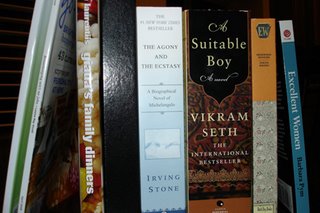I'm sitting here alone in the hotel room. Jeremy's at the house doing some cleanup and some additional work on the floors. Some of the steps in the staircase still squeaked, so Jeremy's trying to fix them. Anyway, I thought I'd do another post. To catch myself up on my book reviews, I'm just going to do a very brief review for each book. Just my general impressions. So here goes. (And if you're laughing because you know I'm incapable of writing a brief post, I know, you're right)
The Known World by Edward P. Jones (The slowest best book I've read in a long time!)

The consensus last week when we talked about this at book club was that we all really liked, some even loved, this book, even though it was such a slow read. What made it such a good book? I think it's hard to pinpoint any one thing, but I'll go ahead and give it a try. One thing that I liked is that it was thought provoking without being preachy. It takes for granted the idea that we all view the institution of slavery as repugnant, and thus simply tries to teach us about the realities of a slave's life. And what a horrible life it was. I can't imagine not having an ounce of control over the events of my day. Even with samll children one can attempt to try to control the day! Slaves were forced to work hard, they had to be completely submissive to their master and his overseer, they had to depend on that same master to be benevolent and provide everything for their well being. Sometimes the provisions were terrible. Sometimes they were passable, but they were never abundant and they were never extravagent. Add to that the complete uncertainty they were forced to live with, and I know I couldn't do it. Imagine not knowing if your wife would be sold away from you in the slave market, or what happened to your children because you'd been sold away from them. The very idea makes me sick to my stomach and sick at heart.
At BYU I had to take a senior course to complete my English degree. I chose to take a course comparing the works of Toni Morrison and William Faulkner. It was one of the best, most eye opening classes I've ever taken. The professor, Gloria Cronin, talked about the long term impact of slavery on the black community. She asserted that many of the social problems that blacks face today are direct results of slavery. Her main argument was that slaves (the ancestors of blacks in America today) were not allowed to form cohesive family units. Thus, children grew up without fathers, and women raised children without husbands. Studies show that the lack of a father figure in a child's life can have devastating results. Crime rates increase, high school dropout rates increase, social mobility becomes nearly impossible. At first I totally agreed with her. It seemed so logical. Then, as I got older and more Utah-ized (read conservative) I began to dismiss the theory as too simplistic. After reading this book, I've come back to it, and I think it has more validity than I gave it. Although people are still responisble for the choices they make, sometimes they don't have a good foundation on which to base those choices. It's probably not the only answer, and I know it's probably not the only theory, but it does give a lot of food for thought.
The President's Lady by Irving Stone 
I read this book for my ward book club. I'd read it previously for real book club (RBC) a few years ago, and knew that it was clean and acceptable for a Relief Society activity. The cover has a quote, "Beyond any doubt one of the great romances of all time," that I find very off putting. I have a hard time thinking of the story of Rachel and Andrew Jackson as a great romance. I really wanted to like Andrew Jackson, really, but I found that I just couldn't. He was so self absorbed and driven, and Rachel suffered for it. I know what it's like to be married to a driven man, but I also know that if I say anything about him neglecting me or our family he will reallign his priorities, and work to be better. Rachel suffered in silence, while Andrew did nothing to alleviate her pain. Well, in all fairness, he did try to defend her honor, but he generally did so in a manner that exposed her to more gossip and hurtful treatment from people outside of her social circle. Had they not put that quote on the cover, I would probably have had a completely different opinion of this book--because I truly enjoyed it. I like historical fiction when it's well researched. From the research I did on the facts surrounding this book, it seemed to be fairly accurate.
I think the thing that we, as women, have to learn from this book is how to support our husbands. Rachel was the epitome of the supportive wife. I'm not sure that her equivilent exists in the modern Western world today. But she was unfailingly supportive of Andrew, sometimes to a fault. But exaggeration is sometimes the best way to make a point. The person of average intelligence will take what is useful from the exaggerated details, tone them down and apply them to become a better person. As for me, I know that I will continually have to remind Jeremy to momentarily turn his head away from his career and focus on the family, but I also know that this is what I agreed to when I married him. The trick is to make peace with your spouse's faults (because they are hopefully accompanied by great strengths, as Jeremy's are) and become accepting instead of critical.





























